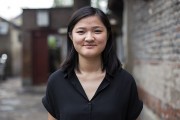The true story of not getting the story
On some days during the summer of 2005, the heat was so oppressive that second auntie joked I’d brought back with me all the hot air from America. In Tianjin, “it never gets this hot in June,” she scolded. That was possible, of course, but I didn’t tell her that where I lived in America, it would have made much more sense if I’d brought back lake effect snow, April showers, and a perpetual overcast that only breaks during glorious summer.
In the decade or so I’d come to spend in Ohio, I grew to love its summers all the more after a hard winter and grayer spring, but on summers in Tianjin, all I remember were the sensations—the cool rush of water to my knees while catching tadpoles in a pond, or the chirpings of cicadas that swelled on humid days. It had been ten years since I’ve been back home to Tianjin. I was nineteen, and the heat didn’t scare me in the least. It was on one of those dog days of summer, the type that begged for school to end and sprinklers to spontaneously burst, when I saw the boys.
I dubbed them the boys of Tianjin. There they were, shirtless, listless, hanging out by a dorm room window three stories high. One of them clutched a cell phone in his hand, and would absent-mindedly flip it open, then close, then open. The boys looked like a group of escapees who just found out that high noon might just be worse than no air conditioning in a shared dorm. They didn’t move away from the sun, however. Between the five of them and their ten limbs dangling from the windowsill, there was a sense of come what might, solar flares, heat, and apocalypse be damned. Their eyes searched for a prey in the landscape below, something, anything to cure boredom or vanquish heat.
I stood in that no man’s land, the basketball court, looking up and grinning at them, taking a mental image to store away for later use. They were doing the same, gawking back at the only moving target who wasn’t ducking into a classroom, the cafeteria, or at least the shade while the sun slobbered on the city. True enough, I was an easy target. I’d meant to be.
Writing in China is like stumbling on a goldmine. Everywhere you look there was a story bursting at the seams. There were the old men practicing Tai Chi at the break of dawn and the middle aged couples at dusk, stepping in with the Cha-cha-cha. There were the anxious faces of parents during the college exam day as they paced in front of high schools across the city. There was the clothing store clerk who, upon realizing that I came from America, commented haughtily that Chinese kids nowadays were devastatingly more fashionable and promptly assembled a more acceptable outfit over my loose t-shirt and shorts. Even the taxi drivers have their two cents in our five blocks of acquaintance. One of the taxi drivers called me a privileged brat, lectured me on the deteriorating values of the youth, and right before I got out, reminded me to always be a good daughter, because, as it was, “who’s paying for this ride? Your parents! Remember that!
I remember a lot of things about China. Memories like nostalgic snapshots with a quality that becomes more penetrating and brilliant as the years go by. They are memories about home. Second auntie always said that the place we were born and raised in would forever be our root, our spiritual home. In my years spent in the U.S., I’ve fancied myself a “global citizen” of sorts, but at heart all I yearned to be was a slick-talking Tianjiner.
Even after ten years, the air in Tianjin still tastes of a familiar sultriness with a pinch of salt and oil. Somebody is always cooking around the corner in China, but over the years open markets and small eateries gave way to Wal-Marts and three-storied, five-star restaurants. As China’s sixth largest city by population, Tianjin went through its own cycle of transformations. Entire neighborhoods have been transformed to high-rise apartment buildings. Empty lots have grown into gardens and amusement parks. Construction is a part of life and everyday the skyline alters like the way the city population fluctuates with migrant workers. But at heart, Tianjin is little changed, and the strolling Tianjiner, known for his good humor and foul mouth, keeps the city’s reputation intact.
Tianjin is my home, and during that summer, in all its glory and grime, it was the greatest city on earth. I wanted nothing more than to own it again after ten years of American suburbia. I wanted to live the city until I wore it inside out, until I knew all its dirty and disillusioned secrets, until I belonged to it again as an imperfect, scribbling Tianjin girl. Until I could write it.
It was my best friend from grade school who, as if reading my mind, suggested that I visit her at school. As Xin and I traded stories over dinner on life, love, China and America in the span of ten years missed, she was the one who smiled and made the invitation. “I go back to school on Monday. What do you say you come with me? We’ve got an extra bed in our dorm.” The hotpot restaurant we ate at was next to the McDonald’s that opened the month I left for the States ten years ago, but at that moment, some things were still the same. At that very moment, Xin was still my first and best friend as I leaped up, slamming my two hands on the table with a yell of “Oh my gosh can I?!” That was how I ended up wandering the basketball court at Xin’s University one afternoon.
The boys in China are an unruly and brazen bunch. Their method of ogling breaks all preconceived notions of the “modest, polite Chinese.” Here, the stares trail the pretty girls walking by until heads cannot possibly turn anymore. Sometimes a boy will actually stop in his tracks, maneuver his body around to follow a girl with his eyes. Usually, though, the pursuit of love goes no further than this. You have to be a real player with a head full of TV dramas to actually ask a girl for her number on the street.
The story was different for one boy standing around a dorm window feeding off the testosterone of his fellows. The boys were scouting the basketball court that divided Xin’s school, the Tianjin Normal University and a vocation school nearby. Because of recent construction at the Xin’s school, the freshmen class was relocated to a temporary campus that shared some facilities with their neighbor.
The boys of Tianjin were from the neighboring vocation school. They jabbed each other in the ribs before egging on their elected chief. His name happened to be Zhang Dong, an ordinary family name coupled with an even more ordinary given name. In an ordinary world, he would probably lead an ordinary life. The vocational schools in Tianjin have its clutch on all the kids who don’t make it into a university. Now that they were in a two-year college, it would only be a continuation of bad grades in high school and a pause on the way to a future they didn’t want. For now, though, they took the pause and lived life like all hot-blooded young men do.
Zhang Dong was tall, thin, tanned, with wispy good looks and a player attitude. He backed his game with a Motorola cell phone in his hand and a bored expression. He was the one who called out amidst the shoving and laughter on a crowded windowsill. His “Hey you, c’mere!” was aggressive yet casual, laughing yet demanding, and it was perhaps this contradiction that made him stood out in the crib of half-naked monkey boys.
“Hey come closer will you? Come closer under the shade so you won’t be in the sun,” he yelled.
“Why? And what’s wrong with the sun?” I yelled back to this rather unusual pick up line.
“I want to get a better look at you. Besides, if you stay in the sun too long you won’t be beautiful!”
If you stay in the sun too long you won’t be beautiful. It doesn’t take too long in a country to realize its beauty standards, and after seeing shelves of sunscreen and whitening lotion at the local convenience store, I knew that the Chinese reverence for pearl-white skin was alive and well. Good thing the rule was only for girls, because I was drawn more to his golden-hued chest, enough to walk under the tree by his dorm window.
“WHAT’S YOUR PHONE NUMBER!?” he screamed.
Zhang Dong proved not to be one of those guys who never call. In fact, he called on the spot after I yelled back my number below his dorm, and somehow wrung a future lunch date out of me. After being bewildered but impressed by his guts, I walked away with a mission. This was it. I had a boy. I had a story. I had a contact to the uncensored, the raw, and the real scope of Tianjin.
Zhang Dong spent the next few days texting me. His messages ranged from short two word greetings to narratives of his daily adventures impressively condensed to 200 characters. I laughed at his troublemaking chronicles of giving hell to his teachers, forgetting all except for a moment that we were nineteen and not going on sixteen. I asked him for more of his tales, and that was when the message came. “I have a lot more stories. I’ll tell you when I see you in person.”
A couple of days later, I rode my rusty pink bike to his school and met up with him for lunch. He brought a friend with him, a short, quiet guy who looked at me with the curiosity of a child. As for Zhang Dong face to face, he was neither the bold romantic hanging out his dorm window nor the charismatic kid in the thick of things via text messaging. In person, he seemed like just another boy lost in the crowd. The three of us walked along the gravel road in near silence. I pushed my bike in front. They walked in the rear. Feeling like a criminal being scrutinized, I turned around and pouted, asking them how their day was and what did they do anyway and what were their majors like I was some ace junior journalist, or worse, their friend. Zhang Dong clutched his phone tightly in his hand. All of a sudden, it dawned on me that I was really just a silly and pretty “foreign” girl to them, but still I thought I’d outsmart the pair of weary eyes and make their mouths move a mile a minute.
It was in their weary eyes that I saw gold. The boys of Tianjin were caught in the limbo of their lives. They were kids from lower income families and areas of Tianjin that I’d never heard of, even after a meaningful nudge of “I’m from… therefore…” from one of Zhang Dong’s text messages. For these boys, the future was already shot by a squandered past. Mediocre grades, bad behavior, and no connections in society seemed to have doomed them for menial hard work. When I asked the boys about the future and if they were looking forward to getting out of school, they flicked their hand, scrunched up their face, and talked about how great school was.
“Are you kidding me? We do shit and pass the days away with friends and video games. Why would I want to even think about the future? After school there’s just work work work… sweat and brow work.”
The Zhang Dong in person, despite a much more subdued manner, was still smooth and cool in his ways. His friend and I followed him into a restaurant near their school, quickly slinking into a private booth, and at his command the waitress was by his side. With a brusque sense of authority, he asked that I order, and never one to back down when challenged, I ordered four dishes. The customary combination of one meat, one fish, one vegetable dish, and soup proved to be too much, but somehow I knew it before the food was on the table, just as they did.
To this day I replay that lunch and try to pinpoint exactly what went wrong. Zhang Dong pressed for us to order beers. I pressed him for stories. We ordered beer, but I wouldn’t drink. So went on the awkward moment of culture clash, as he scoffed that everyone drinks in China out of respect, and if one person doesn’t drink, nobody drinks, and if nobody drinks, the mood just wouldn’t be right to tell stories.
Zhang Dong’s friend, who may actually be the most sympathetic out of the three of us, kept quiet and nodded politely. I turned my attention to him, and tried to pry off some information. Where was he from? Did he like school? What did he do for fun? He would answer the questions automatically, but all I remembered was his half-pressed lips. There was something sincere about him though, so sincere that I knew to give up on the role of junior journalist.
We ate mostly in silence after that. The boys didn’t wolf down all the food as expected, which meant they weren’t being themselves, and I wasn’t about to be a pig, and we ended up with two cartons of food for the microwave. As we packed away the food, scrapping fish bones and draining soup, I wondered a few many things. Who did I think I was, really? Was I after all so removed from this culture that I cannot hold a decent conversation with boys my age? What were these boys thinking? Was there really anything worthwhile behind their facades, or nothing, or did they just not want to take me seriously?
“Tell me your story,” I asked him again and again and then added pressingly. “Tell me your story. You don’t know who I am. I… I’m an American journalist. I write for a living. I write stories.” I need your story.
I needed his story like the way I needed him, needed him to open up like the charismatic boy he was over text messaging, needed his trial and toil and teenage angst. I needed his suffering the way I needed to hear that he didn’t know when his own birthday was, so that I could blow it all up into a socio-economic issue gnawing away at the foundation of the Chinese educational system. But as it was, we were just three kids with three unopened beers sitting in silence.
Zhang Dong’s friend was the first to leave, wandering off to some Internet bar on the block with a hazy explanation. The waitress came to see if we needed anything else and Zhang Dong dismissed her with a wave of a hand. We were then left sitting in silence again, he and I. I was silently fuming. He was staring straight ahead, eyes focused on a cheap landscape painting on the wall.
“Look, maybe I’ll just…” I began, but he cut in.
“Do you have a boyfriend in America?”
“No.”
“Do you have a boyfriend here?”
“No.”
“Why not?”
“I don’t know.”
“I can’t believe you’re from America.”
“How do you really know I’m from America? You don’t even go to the school I stayed at.”
“I know lots of things about you.
“No you don’t, like what?”
“Just a lot of things. I can’t believe you are from Tianjin either, you don’t sound like you’re from Tianjin.”
Somewhere between more small talk and his opinion that an American boyfriend wouldn’t be so bad, he kissed me. His kiss was as feverish as the heat in the restaurant. It was bold and possessive and lonely and desperate. I found the golden boy hanging out his third floor window in that kiss. I found the rebel boy of the text messages again in that kiss. When the phone rang, cutting the kiss, an American friend visiting China with me at the time chattered brightly on the other line, recounting his adventures of the day. I remember mumbling a few happy replies while watching the Chinese boy clutch my waist by my side. He wasn’t looking at me, but was staring straight ahead, neither annoyed nor flushed, neither hero nor rebel, but just a boy.
When I walked out of the restaurant without a scribble in my notepad, I was more perplexed than shocked, more focused on myself than him. In the end, I didn’t get the story I wanted. I had failed even, but I knew I got something from those eyes and that voice; even if was just the memory of it, even if it was just the image of his uneasy stare as he watched me walk out.
Five minutes later, while I was riding my bike furiously against the wind, my phone rang. Two minutes later, I received a text message. That afternoon, I set a personal record for text messages received. The next morning, he called again. After that, I never heard from him. A month later, I deleted the text message that read, “Stop ignoring me. I’ll tell you my story. I’ll tell you everything.”






